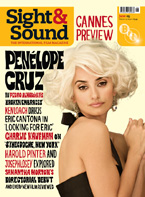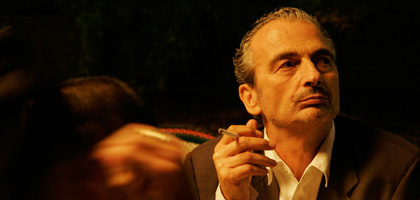Primary navigation

France 2007

Reviewed by Jonathan Romney
Our synopses give away the plot in full, including surprise twists.
Paris, present day. Pierre is a 58-year-old gay man and former gigolo who has been HIV positive for 24 years. He has sex with rent boy Marc, then visits Jacques, a wealthy friend with tax problems. A trip to Pigalle for sex is curtailed because of Pierre's incontinence problem. At his lawyer's, Pierre runs into old friend Paul, a married man who has inherited money from his late lover Gaston, an ex-lover of Pierre - who himself stands to inherit from long-term lover Toutoune. Pierre visits his psychotherapist and discusses his depression. At lunch with Paul, Pierre tells how he visited the house of a deceased lover, hoping to claim the artworks he was to inherit. Pierre ponders the side effects of his medication, gives a blowjob to a man who delivers his groceries, advises a young gigolo and visits his friend David. Finally he dresses in drag to visit a porn cinema with Marc.
Jacques Nolot's second feature La Chatte à deux têtes (Glowing Eyes, aka Porn Theater, 2002) was set in one of Paris' last surviving porn cinemas, a hermetic milieu of homosexual encounters and transactions cloaked in darkness. Its follow-up, Before I Forget, although a much less ritualised drama, presents a similarly enclosed universe: its ostensibly realistic Paris is nevertheless determined by a very specific set of reference points. It is a world defined equally by gay desire and hard economics, a world in which sex always goes hand in hand (or cock in mouth) with financial exchange. On the only two occasions when Nolot's alter ego Pierre welcomes anyone into his solitary apartment, it is for a 'delivery': once of sex, from hustler Marc, the next of groceries (with sex as a side order).
Sex is as immediate and omnipresent here as in the subterranean world of La Chatte, but in Before I Forget it surfaces to occupy the official realm of social affairs, as becomes startlingly apparent in a scene in a lawyer's office. The elderly attorney, soberly declaring the case in hand closed, tells his client he wants him; the client strips off and dispassionately receives a blowjob. Money and sex are linked in a chain of exchange and debt: Pierre and his old friend Paul, both former gigolos, talk about inheritances, past or to come, from older lovers. In this system, everyone is both patron and client: even Toutoune, Pierre's elderly protector, was once a gigolo. The film is full of older gay men married to women, respectable patriarchs and grandfathers. But Nolot doesn't present them as individual closet cases so much as suggest that the visible heterosexual order of authority and financial power is fundamentally and secretly a homosexual one.
This picture of society seems as tightly focused as the world of Jean Genet, ruled by sex and crime. But Nolot's urbane and - sometimes, at least - decorous world is closer to the literary universe of André Gide, and there is a very Gidean self-reflexivity in the glimpses of Pierre's activity as a writer. One close-up of a handwritten sheet shows us, effectively, the transcript of (or script for) the conversation he has just had with Paul, as if this very discursive film were a work in progress, written as we watch it.
Before I Forget is the third in a series of films that Nolot has called "semi-autobiographical". They are among the most intensely personal works in recent French cinema: shot in his own flat, the new film also contains specific references to Nolot's past, notably his liaison with Roland Barthes. After La Chatte, a stylised socio-anthropology of the Paris cruising scene, Before I Forget returns to the sombre themes of L'Arrière-pays (Hinterland, 1998), in which Nolot played a man confronting his mother's death. This time the film-maker contemplates his own mortality. Death has long been consecrated as a keystone of Aids-era gay cinema, and HIV-related mortality is an important element here: contemplating the possible side effects of his medication, faded beau Pierre balks only at the prospect of his hair falling out, the loss of his looks being the one thing he cannot countenance.
But this aspect of the mortality theme is subsidiary to a larger sense of time's passage: of men growing old and handing the baton (as well as their wisdom and wealth) to younger lovers and successors. Nolot lays his body on the line to support the theme: when Pierre is fucked by the arrogant, Adonis-like Marc, Nolot appears naked, still dapper but pot-bellied and saggy, and willing to cast dignity to the wind as he almost abases himself "comme une chienne" ("like a bitch"), albeit in a blasé, routine fashion. The film's most poignant moment comes when Pierre searches an ex-lover's house and finds photographs of his young self: handsome, fit and looking pretty damn confident of his immortality. Nolot abandons vanity altogether in the closing scene, in which he visits a porn cinema in drag. Rakishly presentable as a man, Nolot en travesti looks decidedly rough and sinister, like a goth matron; he has the camera hold on him at length, mercilessly, as he poses to a funereal passage of Mahler. In the closing shot, Pierre walks into a wall of darkness, ostensibly a shadowy auditorium, metaphorically the oblivion of self-negating abandon, or the death presaged at the film's start by a black dot gradually engulfing a white screen.
Such strong images are rarities in a severe, matter-of-fact film that often seems visually functional, primarily concerned with language and performance. But Before I Forget is executed with such spareness and thematic concentration that it is certainly no less cinematic than the work of Eric Rohmer or Catherine Breillat. This is a grimly disillusioned film, for sure, in its contemplation of a world underwritten by vanity and acquisitiveness. But Nolot's wry, understated performance imparts an intimacy and an existential urgency that make Before I Forget a moving, courageous act of self-revelation.